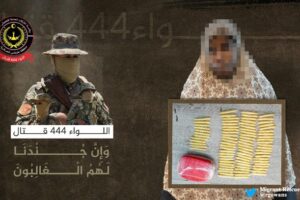Five leaders from a predominantly Christian militia in Central African Republic were given life terms on Friday for war crimes and crimes against humanity after dozens of Muslims were slaughtered in a southeastern town in May 2017.
Twenty-eight individuals were sentenced in all, climaxing a trial at the Criminal Court in the capital Bangui that broke new ground in a country struggling to provide justice for victims of militia violence.
“It’s the first time that a sentence for crimes against humanity has been handed down by a CAR court,” Justice Minister Flavien Mbata said, an assertion backed by the International Federation of Human Rights (FIDH).
Two commanders, known by their nicknames of Pino Pino and Bere-Bere, as well as three other senior figures, Romaric Mandago, Patrick Gbiako and Yembeline Mbenguia Alpha, were given life sentences of forced labour.
The others were given terms of between 10 and 15 years of forced labour, mainly for murder and illegal possession of weapons.
The sentences can only be appealed once under CAR law.
Massacre
One of the world’s poorest countries, the CAR has been grappling with violence since 2013.
The “Pino Pino” militia was one of the predominantly Christian and animist armed groups that sprang up to combat a mainly Muslim rebel coalition, the Seleka.
Vicious fighting brought the country to the brink of sectarian war, prompting intervention by France, the former colonial power.
CAR President Faustin-Archange Touadera now governs with the support of MINUSCA, a 14,700-strong UN peacekeeping force.
But armed groups control two-thirds of the country, typically claiming to represent a religious or ethnic group and frequently fighting over its rich mineral resources.
The trial concerned an attack on a district in the southeastern town of Bangassou and a nearby UN base on May 13 2017.
According to the UN, 72 people were killed, 76 were wounded and 4,400 people fled their homes.
The militiamen especially targeted members of the Muslim community who had taken refuge in the town’s Catholic church.
Ten UN peacekeepers were killed in attacks by armed groups in the Bangassou area between May and November 2017.
Pino Pino is the nom de guerre of a self-described general named Crepin Wakanam, and Bere-Bere is the name of his lieutenant, Kevin Bere.
Bere-Bere turned himself into a MINUSCA base in January 2018, saying he sought their protection against his former chief.
Four months later, Pino Pino was arrested with 33 followers in the neighbouring Democratic Republic of Congo, which then extradited him.
Friday’s verdict came two days after the first anniversary of a peace agreement signed in Khartoum between the government and 14 militia leaders — the eighth such attempt to end violence.
Fighting has forced nearly a quarter of 4.5 million people in the CAR to flee their homes.
Judicial Void
The FIDH said Friday’s verdict “demonstrates the growing will of the CAR judicial authorities to conclude high-profile trials of the perpetrators of violence and international crimes.”
It is the first time a CAR court has ruled on a massacre of this scale.
The country’s judiciary has been hobbled by lack of funding and a weak central government.
A Special Criminal Court (SCC), a hybrid body comprising national and international judges, was tasked in 2018 with handing down punishment for serious violations of human laws but has not revealed the status of its inquiries.
AFP










Add Comment